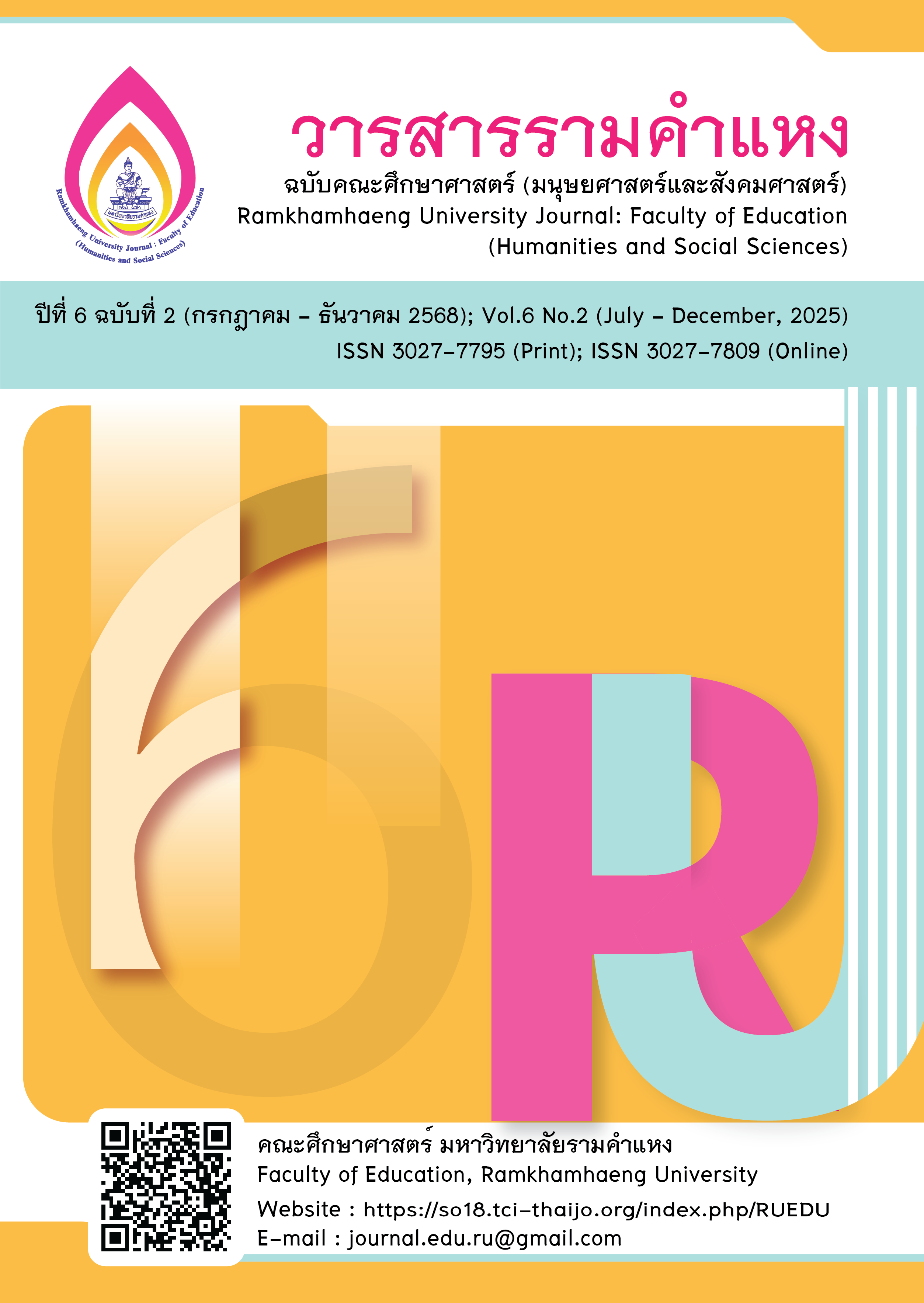The effects of an integrative individual online counseling program based on narrative theory and psychological training on the perfectionism of Generation Y employees
Main Article Content
Abstract
This study aimed to examine the effects of an integrative individual online counseling program based on narrative theory and psychological training on the perfectionism of Generation Y employees. The sample comprised 20 full-time employees aged between 27 and 42, working in companies located in Bangkok, who scored above the threshold for perfectionism. The experimental group (n=10) received the integrative individual online counseling program based on narrative theory and psychological training, while the control group (n=10) did not receive the intervention. The research instruments included a perfectionism assessment and the integrative individual online counseling program. Perfectionism scores were measured at three stages: pre-intervention, post-intervention, and follow-up. The findings revealed that the experimental group had statistically significantly lower mean perfectionism scores at both post-intervention and follow-up stages compared to the pre-intervention stage (p < .05). Furthermore, the experimental group’s mean perfectionism scores at post-intervention and follow-up stages were statistically significantly lower than those of the control group (p < .05). Thus, the integrative individual online counseling program based on narrative theory and psychological training is effective in reducing perfectionism tendencies among Generation Y employees.
Downloads
Article Details

This work is licensed under a Creative Commons Attribution-NonCommercial-NoDerivatives 4.0 International License.
ผู้ส่งบทความ (และคณะผู้วิจัยทุกคน) ตระหนักและปฎิบัติตามจริยธรรมการวิจัยอย่างเคร่งครัด ทั้งนี้บทความ เนื้อหา ข้อมูล ข้อความ ภาพ ตาราง แผนภาพ แผนผัง หรือข้อคิดเห็นใดๆ ที่ปรากฎในบทความ เป็นความคิดเห็นและความรับผิดชอบของผู้ส่งบทความ กองบรรณาธิการไม่จำเป็นต้องเห็นตามเสมอไป และไม่มีส่วนรับผิดชอบใดๆ โดยถือเป็นความรับผิดของของเจ้าของบทความเพียงผู้เดียว
References
Afrasiabi, D. (2020). The effectiveness of the narrative therapy on the fear of negative/positive evaluation and social phobia symptoms in socially anxious female students. Psychiatria, 17(4), 181-185.
Beheshtifar, M., Mazrae-Sefidi, F., & Nekoie Moghadam, M. (2011). Role of perfectionism at workplace. European Journal of Economics, Finance and Administrative Sciences, 38, 167-173.
Birrer, D., & Morgan, G. (2010). Psychological skills training as a way to enhance an athlete's performance in high‐intensity sports. Scandinavian journal of medicine & science in sports, 20, 78-87.
Brand Inside. (2020). Did you know? 7 out of 10 Bangkokians experience burnout: Research reveals which businesses can meet their needs. Brand Inside. https://brandinside.asia/burnout-in-the-city/ (in Thai)
Carr, A. (1998). Michael White's narrative therapy. Contemporary Family Therapy, 20, 485-503.
Chueaphun, P. (2018, October 18). Health problems of Millennials. Samitivej Hospital. https://www.samitivejhospitals.com/th/article/detail/สุขภาพ-millennials (in Thai)
Cronbach, L. J. (1990). Essentials of psychological testing (5th ed). Harper & Row.
Curran, T., & Hill, A. P. (2019). Perfectionism is increasing over time: A meta-analysis of birth cohort differences from 1989 to 2016. Psychological Bulletin, 145(4), 410-429.
DeKruyf, L. (2008). An Introduction to Narrative Therapy. In Jordan K. (Ed.), The quick theory reference guide: A resource for expert and novice mental health professionals (pp. 445–460). Nova Science Publishers.
Dong-gwi, L., Ha-rim, S. & Seo-young, K. (2024). Four perfectionists. (N. Suwannachot, Trans.). Amarin Printing & Publishing . (Original work published 2021) (in Thai)
Fang, T., & Liu, F. (2022). A Review on Perfectionism. Open Journal of Social Sciences, 10(1), 355-364.
Frost, R. O., Marten, P., Lahart, C., & Rosenblate, R. (1990). The dimensions of perfectionism. Cognitive Therapy and Research, 14, 449-468.
Ghavibazou, E., Hosseinian, S., & Abdollahi, A. (2020). Effectiveness of narrative therapy on communication patterns for women experiencing low marital satisfaction. Australian and New Zealand Journal of Family Therapy, 41(2), 195-207.
Howell, D. C. (2007). Statistical methods for psychology (6th ed.). Dexbury Press.
Johanna, S. (2002). Applications of Narrative Theory and Therapy to the Practice of Family Medicine. Family Medicine, 34(2), 96-100.
Juito, S. (2011). Systematic training: A new learning theory approach. Textbook Promotion Project, Academic Division, Sukhothai Thammathirat Open University. (in Thai)
Katamat, W. (2022, November 30). Perfectionist Everything in life must not go wrong, but may break your heart without realizing it. Bangkok Business News. https://www.bangkokbiznews.com/health/well-being/1040740 (in Thai)
Kulnapadol, P. (2022). Family Counseling (4th ed.). Department of Research and Applied Psychology, Faculty of Education, Burapha University. (in Thai)
Milne, A. (2003). Teach yourself counseling. Cox & Wyman Morganett.
Ninsira, S. (2022, December 9). Gen Y Why always me? : 8 problems that Gen Y must face in this era. https://www.agenda.co.th/lifestyle/fun/genmillennials/ (in Thai)
Øverup, C. S., Brunson, J. A., Steers, M.-L. N., & Acitelli, L. K. (2017). I Know I have to earn your love: how the family environment shapes feelings of worthiness of love. International Journal of Adolescence and Youth, 22(1), 16-35. doi:10.1080/02673843.2013.868362
Phothisa, S. (2023, February 7). Revealing the numbers of Thai people of each generation, an important variable in the 2023 election. Thai TBS. https://www.thaipbs.or.th/now/content/61 (in Thai)
Privitera, G. J. (2015). Statistics for the behavioral sciences (2nd ed.). Sage Publications.
Rinthaisong, I. (2014). Determining the Content Validity Index (CVI). Faculty of Management Sciences, Prince of Songkla University. (in Thai)
Rozental, A. (2020). Beyond perfect? A case illustration of working with perfectionism using cognitive behavior therapy. Journal of Clinical Psychology, 76(11), 1-14.
Shafran, R., & Mansell, W. (2001). Perfectionism and psychopathology: A review of research and treatment. Clinical Psychology Review, 21(6), 879-906.
Shafran, R., Cooper, Z., & Fairburn, C. G. (2002). Clinical perfectionism: a cognitive-behavioural analysis. Behaviour research and therapy, 40(7), 773–791.
Stoeber, J. (2014). Perfectionism. In R. C. Eklund & G. Tenenbaum (Eds.). Encyclopedia of sport and exercise psychology (Vol. 2, pp. 527-530). Sage Publications.
Watthanaprom, B. (2010). A Study and Development Self-Acceptance Program of Prisoners by The Iddhipata4. [Master thesis, Srinakharinwirot University]. http://thesis.swu.ac.th/swuthesis/Gui_Cou_Psy/PhraBuntherm_W.pdf (in Thai)
White, M. (2007). Maps of Narrative Practice. WW Norton & Company
Yahghoubi, H., & Mohammadzadeh, A. (2015). Comparison of perfectionism and related positive-negative dimension in people with high traits on obsessive compulsive and eating disorder characteristics. Iranian Journal of Psychiatry and Behavioral Sciences, 9(3), 1-5.
Yoomimai, R. & Thaithani, P. (2020). The Effects of Psychological Training on Goal Setting to Learn of Secondary Education Grade 3 Students. Ratchaphruek Journal, 18(1), 74-82. (in Thai)


